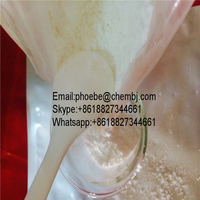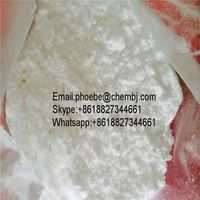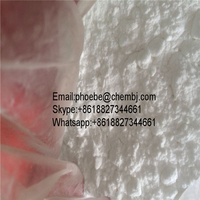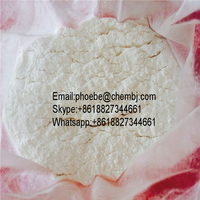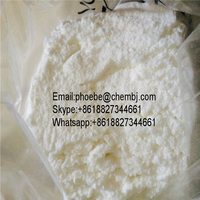PF-2341066/Crizotinib
Product Quick Detail
- Minimum Order
- 1
- Packaging
- According to Customer′s Requirements
- Delivery
- 15 Days
Specifications
PF-2341066/Crizotinib
Pharmaceutical Anti-cancer & immunity Crizotinib /Email:phoebe@chembj.com
Product Name: PF-2341066/Crizotinib
Synonyms:
3-[(1R)-1-(2,6-dichloro-3-fluorophenyl)ethoxy]-5-[1-(4-piperidinyl)-1H-pyrazol-4-yl]-2-Pyridinamine;(R)-3-(1-(2,6-dichloro-3-fluorophenyl)ethoxy)-5-(1-(piperidin-4-yl)-1H-pyrazol-4-yl)pyridin-2-amine;3-[(1R)-1-(2,6-Dichloro-3-fluorophenyl)ethoxy]-5-[1-(4-piperidinyl)-1H-pyrazol-4-yl]pyridin-2-amine;Crizotinib;PF
2341066;PF-02341066;PF-2341066/Crizotinib;3-[1-(2,6-Dichloro-3-fluoro-phenyl)-ethoxy]-5-(1-piperidin-4-yl-1H-pyrazol-4-yl)-pyridin-2-ylamine
CAS: 877399-52-5
MF: C21H22Cl2FN5O
MW: 450.343
Product Categories: Aromatic;Chiral Reagents;Heterocycles;Inhibitors;Intermediates & Fine Chemicals;Pfizer Compounds;Pharmaceuticals;Inhibitor;Anti-cancer & immunity
Chemical Properties White Solid
Usage A potent and selective dual inhibitor of mesenchymal-epithelial transition factor (c-MET) kinase and anaplastic lymphoma kinase (ALK). A potential antitumor agent.
Usage Crizotinib is a potent and selective dual inhibitor of mesenchymal-epithelial transition factor (c-MET) kinase and anaplastic lymphoma kinase (ALK). Crizotinib is a potential antitumor agent.
Usage PF-2341066 (Crizotinib) is a potent inhibitor of c-Met and ALK with IC50 of 11 nM and 24 nM, respectivley .
Crizotinib Description:
Crizotinib (PF-02341066) is a potent inhibitor of c-Met and ALK with IC50 of 11 nM and 24 nM, respectivley.
Crizotinib Application:
The inhibitory effects of crizotinib on MP cells and SP cells were determined by colony formation assay. The IC50 value of crizotinib for MP cells was 21.3 nM. Of note, the SP cells showed no
significant changes after crizotinib treatment. However, the SP cells showed a cell survival rate of 50.0±0.6% following a combined treatment of crizotinib (22.4 nM) and verapamil (500 μM),
compared with 105.3±0.4% survival of SP cells treated with crizotinib (22.4 nM) alone. The growth curves obtained demonstrate that crizotinib inhibited the growth of SP and MP cells, and this
inhibition was dependent on both concentration and time.
Tumorigenicity was examined using immune-deficient mice, into which SP or MP cells of LLC were subcutaneously transplanted. Nonsorted LLC cells formed xenografts in mice at 1x105 cells. Tumor size
was significantly decreased in the crizotinib-treated LLC groups (225±29 mm3) compared to the untreated group (PBS: 834±41 mm3) by 40 days after treatment.
Note:
If you are intersted in our products, please contact us !
Email:phoebe@chembj.com
Skype:+8618827344661
Phone(whatsapp):+8618827344661
- Country: China (Mainland)
- Business Type: Manufacturer
- Market: Global
- Founded Year: 2001
- Address: 496 Zhongshan Road,Wuhan
- Contact: Caroline Chen


